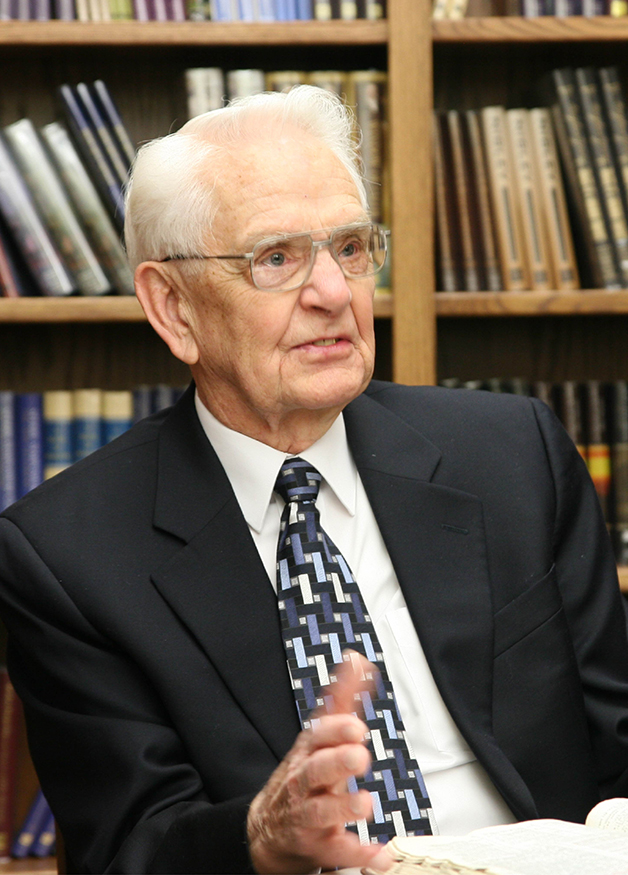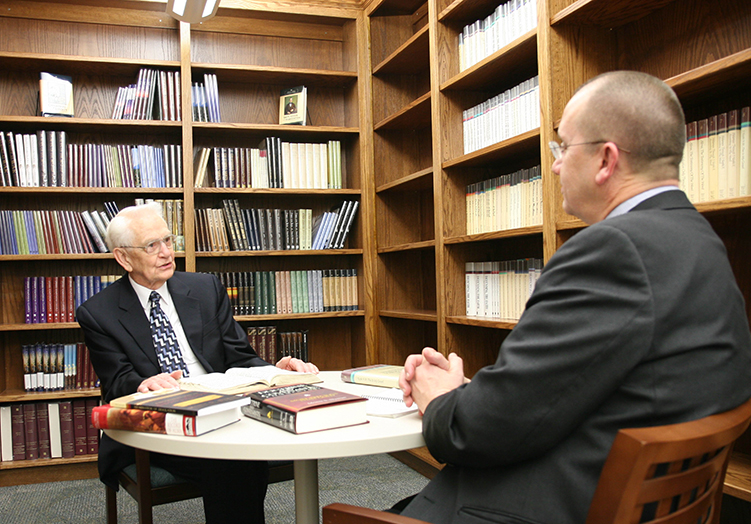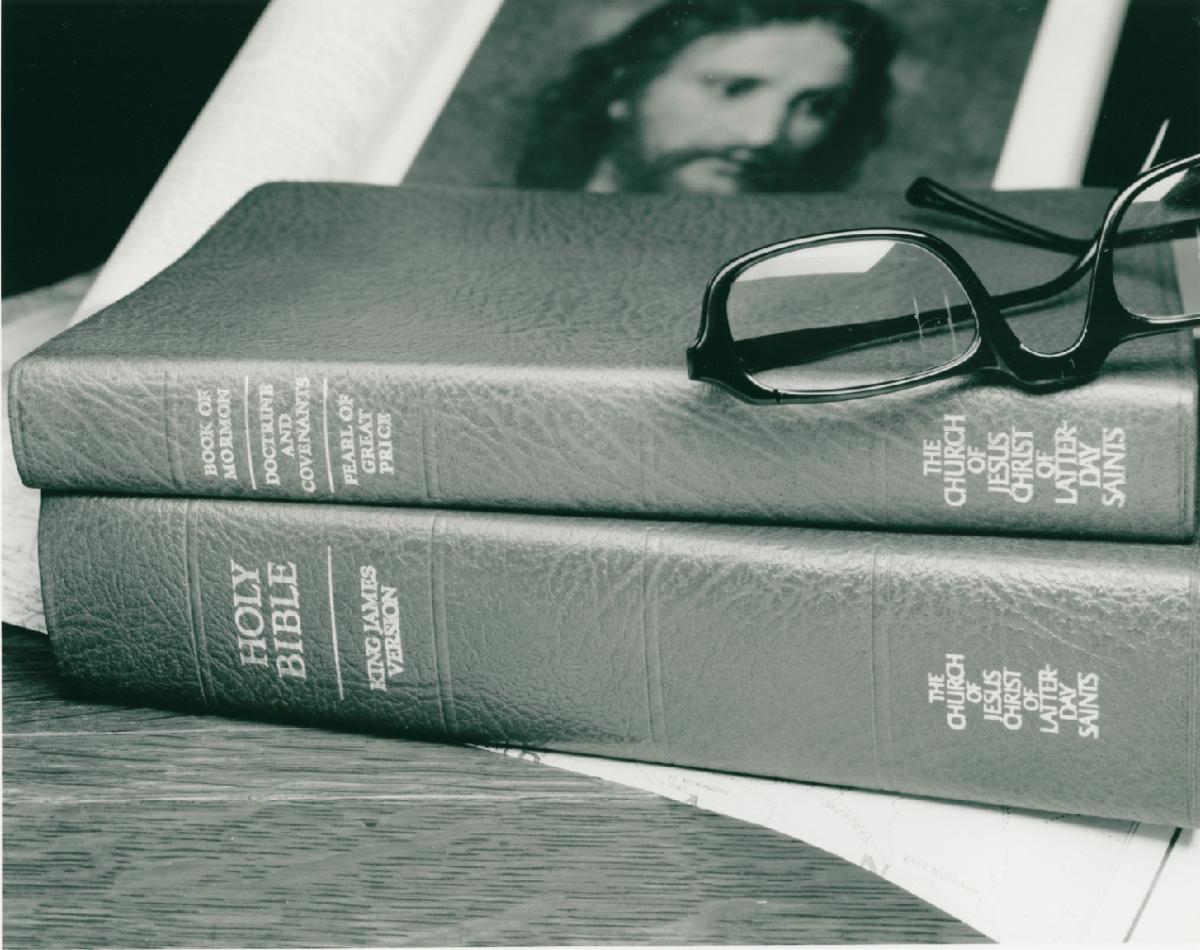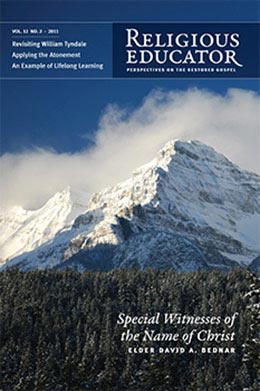An Example of Lifelong Learning: Monte S. Nyman
Monte S. Nyman
Monte S. Nyman is a professor emeritus of ancient scripture at BYU, "An Example of Lifelong Learning: Monte S. Nyman," Religious Educator 12, no. 2 (2011): 195–202.
Monte S. Nyman was a professor emeritus of ancient scripture at BYU when this was written.
 "I felt I had learned some things that others may not know, and I ought to share it with them. I did not care about making money on the books ....I just wanted to share my learning." Photo by Richard B. Crookston
"I felt I had learned some things that others may not know, and I ought to share it with them. I did not care about making money on the books ....I just wanted to share my learning." Photo by Richard B. Crookston
Religious Educator (RE): In a revelation given in December 1832, the Lord said, “As all have not faith, seek ye diligently and teach one another words of wisdom; yea, seek ye out of the best books words of wisdom; seek learning, even by study and also by faith” (D&C 88:118). So it seems that very early in the Church, the Lord was saying, “Look, the scriptures aren’t the only things that should be read or written.” Some of this knowledge is learned by faith and prayer, but some of it is learned by studying. You have always seemed to be engaged in learning. What sparked that love for learning?
Nyman: I would have to go back to my mission. I hate to admit this, but I really did not read the scriptures very much before I went on a mission. When I finally realized how precious and important they are, I studied them continually. I just wanted to know more, and I kept studying diligently. I came home and coached football, basketball, and baseball at Grace High School in Idaho for a couple of years. Even when I was coaching, I would go home at night and study the scriptures.
RE: But what was it about the scriptures? What light turned on in your mind?
Nyman: That light turned on when I served my mission in Minnesota. In my first interview with my mission president, he asked me if I knew the gospel was true, and I said, “I believe it or I wouldn’t be here.” Then he promised me that if I would study and pray, I would know that it was true, and I received my answer during the first couple of months I was serving. As a returned missionary, I made a habit of studying something out of the scriptures every day, because as a missionary you learn a great deal, but you do not learn everything. Occasionally, I am afraid that all we know as missionaries is what we have memorized for the lessons, but that is just the groundwork and we can extend our knowledge from there. So I guess that was my incentive to know as much as I could.
RE: And eventually you became a full-time religious educator.
Nyman: A Church Educational System administrator in Idaho asked me if I would be interested in teaching seminary. At first I hesitated and told him I was not really interested. I loved coaching. He asked, “Where do you want to live?” I told him, “Logan.” He said, “We’ll get you a job there if that’s where you want to live.” I was still hesitant to go because I really loved coaching, but we made the decision to go to Logan, where I grew up, and I taught seminary at South Cache High School for two years. Then my supervisor asked me to join the institute program, which was a good change for several reasons. Institute gets a little deeper into the scriptures and offers more variety. It also gave me the opportunity to teach different classes (one semester I taught seven different classes). I had to study continuously to teach them because I was not familiar with all the material. But I loved the scriptures, and I still love them and read them.
RE: When did you start reading books besides the scriptures to help you teach?
Nyman: As I taught, I would look at the manual and other books on the topic. I started to acquire books that I thought were exceptional, and I studied them, always together with the scriptures. I did not just study a book about the scriptures, but I would study the scriptures and then see what someone else had said about them.
RE: What books helped you discover gospel scholarship?
Nyman: The Comprehensive History of the Church, by B. H. Roberts. It had a great impact on me. I read Jesus the Christ and The Articles of Faith and books by Daniel H. Ludlow. As I read them, I would note the sources that were quoted. I just love to learn.
RE: How many books have you written or edited?
Nyman: I have written about fifteen books, and I have edited a Religious Studies Center (RSC) series. I have cowritten a couple of books and approximately thirty articles. My total publications amount to at least fifty.
RE: That production is more than the average person who has a whole career at BYU. It is one thing to read, and another to read other books and try to bring them together. The next step seems to be to write; it clarifies your thinking.
Nyman: I started with a little book about the Book of Mormon testifying of the Bible, very small, less than a hundred pages. While I studied non-Mormon scholars’ division of authorship, I saw that I did not agree with the claims that Isaiah did not write Isaiah. So I studied and prepared the arguments and put them in print. We published only one hundred copies.
 "I wanted to share...what I had learned. It is my nature that whatever I do, I do my best." Photo by Richard B. Crookston.
"I wanted to share...what I had learned. It is my nature that whatever I do, I do my best." Photo by Richard B. Crookston.
That was my start. But my first real book was Great Are the Words of Isaiah. I had some encouragement for writing it. A good friend and missionary companion of mine who today is a federal judge sat in on my class and asked, “Why don’t you put these ideas into a book? Why don’t you publish this?” He gave me encouragement and prodded me along the way.
I sent the manuscript to Deseret Book, and they sent it back and said, “It’s a good manuscript, but no one will buy a book on Isaiah—there is no interest.” So I took it down to Bookcraft, and they gave me basically the same story, but they said, “We really like it; let us think about it.” When I told my friend about their responses, he said, “Let’s finance it.” So I talked to Bookcraft again, and they said, “We don’t work that way, but we will publish six thousand copies, and if we have not sold a couple thousand copies in the first year, you will have to buy the ones that are left.” We signed a contract saying that we would buy back whatever was not sold. The book was released in October 1980, and I thought, “At general conference—maybe we will sell a few. Christmas—maybe we’ll sell a few. And next Christmas—maybe we won’t be stuck with a big bill.” I went back to school after the Christmas holiday, and Bookcraft called to say, “Your first edition sold out.” If I remember, it was 6,200 copies. I said, “Are you going to reprint it?” They said it was already at the press. The book is still in print thirty years later.
RE: You really brought out what the prophetic leaders said about Isaiah, and you put it in a way that made it easy for Latter-day Saints to understand it.
Nyman: In Great Are the Words of Isaiah, I included what they called then the Inspired Version, the Joseph Smith Translation. I included quotes from the Doctrine and Covenants and from the Book of Mormon that would sustain the interpretation of Isaiah. I particularly emphasized that Jesus commanded us to study Isaiah, testifying, “Great are the words of Isaiah” (3 Nephi 23:1). Then as we continue on in 3 Nephi 23, we learn that other prophets testified of the gospel of Christ, so that led me to do a book on Jeremiah and eventually other Old Testament prophets. The Book of Mormon proves that the Bible is true, and showing this relationship was became my purpose. After that, I thought, “Maybe there are other things that people would like to know.” I wanted to share with them what I had learned. It is my nature that whatever I do, I do my best.
RE: So in your classes you basically taught what you were studying, what you enjoyed and got excited about learning. What you really were doing in publishing was simply expanding the walls of the classroom to a bigger audience, to people who could not sit in your class. So now people are reading in California or Maryland without sitting in the classroom.
Nyman: That is a nice way to look at it. Through the years I get thank-you letters from readers. They say things like, “I never knew anything about Isaiah (or something else), and I learned something.” That is the best paycheck I ever receive—their comments that they understand the scriptures or the doctrine better now because of what they have read.
RE: So you had an amazing career teaching at BYU, but, on top of that, you also have some administrative responsibilities.
Nyman: Yes, I was the division chair of Book of Mormon teachers, and then I served as the acting chairman of Ancient Scripture twice. I was associate dean for nine years under Dean Robert J. Matthews. I was always involved in administrative responsibilities.
RE: It is the tendency, and naturally so, when someone gets into administration, that the desire to teach and research and write decreases because administration is a hard job. Administrators are worried about all kinds of things. During that long period, what was it that made you seek out of the best books and keep learning?
Nyman: Teaching is learning. As I did administrative work, I really missed the classroom, so I taught. Since I was responsible for making the teaching schedule, I decided I wanted to teach more than one class. Most administrators taught only one class. I taught three classes plus a night class for ten years. I taught several different classes in order to keep learning about all the scriptures. I taught at least half of the time, because I loved it, and that was where I kept my desire to learn alive.
RE: You have published a lot of books, like your multivolume Doctrine and Covenants commentary, Ezekiel in the last days, the Book of Mormon series, and many others—unbelievable! Why?
Nyman: I felt I had learned some things that others may not know, and I ought to share it with them. I did not care about making money on the books, and I have not made a great deal. I just wanted to share my learning. And I found that by writing it down, it helped me. As I continued teaching, I gained insights while writing.
RE: So these books—the Book of Mormon commentary series, Doctrine and Covenants commentary series—these are not your old yellow classroom notes that, now that you have retired, you have time to put into a book. You are saying that this is new material? Rethinking the scriptures again?
Nyman: I started from my notes, and as I was writing I would get a new idea. I would then go back and study it out and enlarge on what I taught. I prepared. I never taught a class with the same lesson outlines, with only one or two exceptions in my forty years of teaching. I taught from the scriptures and learned from the scriptures. If I was teaching and a new idea came to me, I would make a little checkmark in the book. Then after the class I would write down and expand the idea I had learned. I think that is a great principle—the Lord will teach you as you learn, but you need to keep a record of it. It is an incentive to write down what you learn.
RE: Jesus basically challenged the Nephite Saints, if something sacred happens, do you record it? Don’t you treasure it? So it seems that if he is teaching you as an individual, and you are not recording it, you are basically telling the Lord you do not treasure it.
Nyman: Yes, I would agree. Most people shun away from Isaiah, saying, “I can’t understand it.” That was a challenge to me. The Book of Mormon would not include all those chapters in there if they had not been important. The authors had so much more material. All of the four major authors said they were not including a hundredth part of what they could. I thought, “If it is that important, then let’s find out from what is in there and what it means.” That was my incentive. I read Isaiah’s words in the Book of Mormon, and I tried to see what Nephi or others, including the Savior himself, had said about them. As I expanded my knowledge about Isaiah, I was able to share that knowledge with others.
RE: Two questions: (1) how does one acquire the desire to be a lifelong learner? And (2) how do we transmit that desire to the next generation?
Nyman: To the first question, how does one acquire the desire to learn, I think you just do it. As I studied, I learned and just had an insatiable desire to know what the Book of Mormon taught. And the second question, how do we get others to do the same, I don’t know. It is something that individuals have to gain for themselves. We can encourage it, we can plant a seed, but each person must gain that desire for themselves.
Whenever I had extra time, I spent it reading the scriptures. I looked for ways to set goals. I did not read a chapter a day. I don’t think that’s the way to do it. If you read a chapter a day, that is good, but you are just meeting a goal. I read when I had time to read, and then I stopped. And then the next time I would start from there and go on. Joseph Smith made a statement about the Bible. It is on page 56 in Teachings of the Prophet Joseph Smith: “He who reads it oftenest will like it best.” I was doing that before I ever read this quote, but I certainly love that statement.
RE: The truth is that there are faculty members who come in and clock in and do their job and go home. They are honest, right, good people, but you burned the midnight oil. You exuded a desire to learn.
Nyman: I think that’s a correct analysis. I just fell in love with the scriptures on my mission, I knew that they were true, and I wanted to know as much about them as I could. When I lived in Alberta, Canada, where I spent four years as an institute director, I burned the midnight oil. I studied every assignment before I went, and as I already said, I did not have to teach that many classes, but whenever a student would come in to me saying, “We don’t know anything about the Pearl of Great Price,” I would answer, “We will teach a class about it.” So I added a class with only seven or eight students. I did not know that much about the Pearl of Great Price, so it was a challenge, but I taught it. I have always felt that my assignment here on this earth is to teach the gospel. My patriarchal blessing states this, and I noticed the promise after I read it again.
 "Whenever I had extra time, I spent it reading the scriptures." Jed Clark, Intellectual Reserve, Inc.
"Whenever I had extra time, I spent it reading the scriptures." Jed Clark, Intellectual Reserve, Inc.
RE: There are different ways to study, but what method has worked for you?
Nyman: People come up and have asked me through the years, “How do you read the scriptures? How do you mark them?” And my answer has always been, “You have to develop your own system. What works for me won’t necessarily work for you, but you need find out what is effective for you.” I had a missionary companion who picked up my triple combination and thought it was his, and he was underlining every word. I felt bad when I saw that. If you underline everything, what good is that going to do? I have a little color system that I use. Blue is history, red is doctrine, and green is a second witness to what the Bible says. Those are the three colors I use.
RE: Why do you think the Lord is interested in our being lifelong learners? We are definitely encouraged not to stop when we finish school but to keep going.
Nyman: I think because it is not going to stop when we leave this earth either. I think of the hundreds of thousands of pages of books we are promised we will have given to us: the sealed portion of the Book of Mormon, the plates of brass, and the records the Jaredites brought with them. We are promised we are going to get those records back. I am looking forward to that. I hope I will be a faster reader. When we get those records, there are going to be so many sources of information. We look at the first eleven chapters of Genesis, covering a couple of thousand years. We do not know much. For example, in the eleventh chapter, there are ten generations from Noah to Abraham, and all it says is “he begat this son,” and so forth. There must have been some very interesting things going on there, and I am curious to know what they were.
